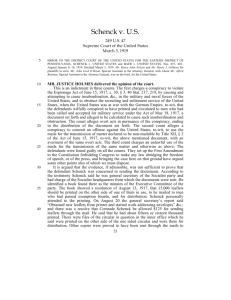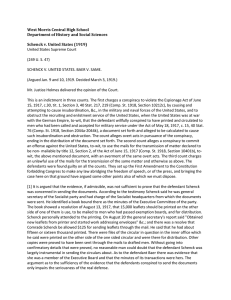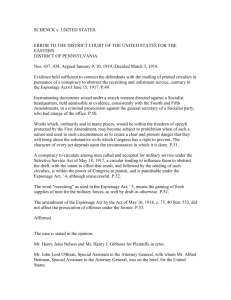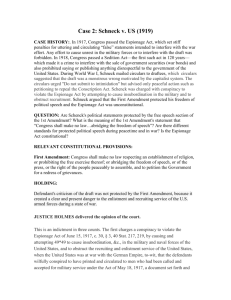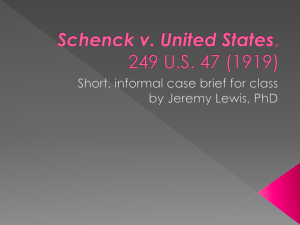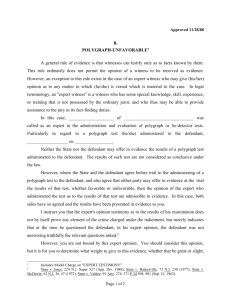SCHENCK v. UNITED STATES 249 U.S. 47 (1919) MR. JUSTICE
advertisement
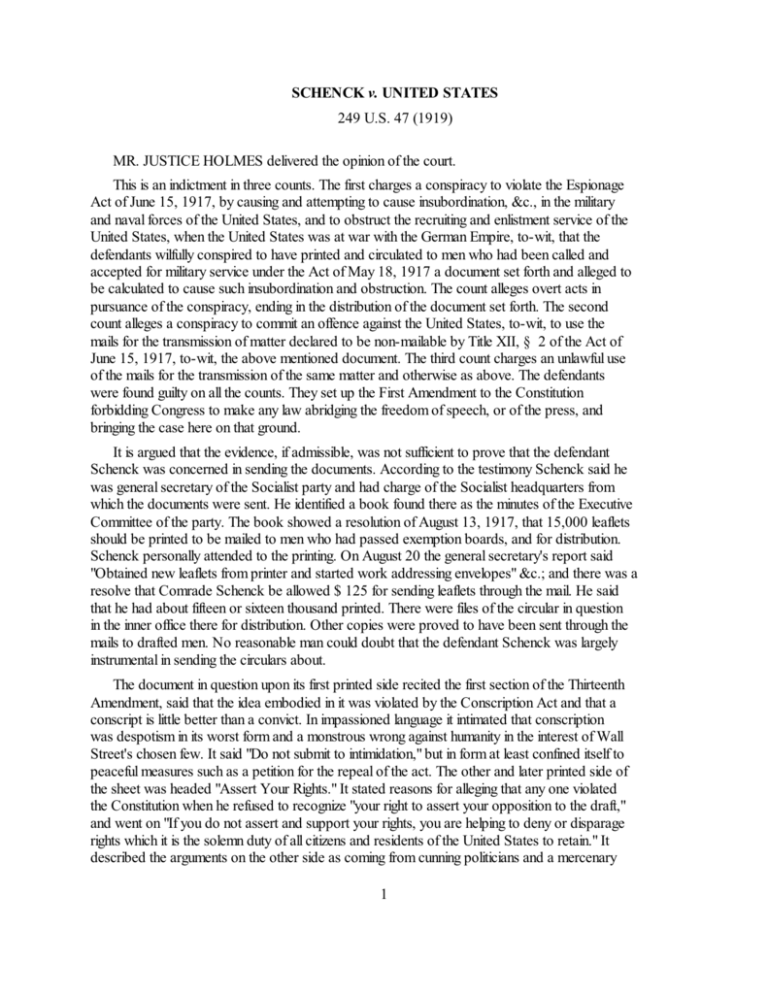
SCHENCK v. UNITED STATES 249 U.S. 47 (1919) MR. JUSTICE HOLMES delivered the opinion of the court. This is an indictment in three counts. The first charges a conspiracy to violate the Espionage Act of June 15, 1917, by causing and attempting to cause insubordination, &c., in the military and naval forces of the United States, and to obstruct the recruiting and enlistment service of the United States, when the United States was at war with the German Empire, to-wit, that the defendants wilfully conspired to have printed and circulated to men who had been called and accepted for military service under the Act of May 18, 1917 a document set forth and alleged to be calculated to cause such insubordination and obstruction. The count alleges overt acts in pursuance of the conspiracy, ending in the distribution of the document set forth. The second count alleges a conspiracy to commit an offence against the United States, to-wit, to use the mails for the transmission of matter declared to be non-mailable by Title XII, § 2 of the Act of June 15, 1917, to-wit, the above mentioned document. The third count charges an unlawful use of the mails for the transmission of the same matter and otherwise as above. The defendants were found guilty on all the counts. They set up the First Amendment to the Constitution forbidding Congress to make any law abridging the freedom of speech, or of the press, and bringing the case here on that ground. It is argued that the evidence, if admissible, was not sufficient to prove that the defendant Schenck was concerned in sending the documents. According to the testimony Schenck said he was general secretary of the Socialist party and had charge of the Socialist headquarters from which the documents were sent. He identified a book found there as the minutes of the Executive Committee of the party. The book showed a resolution of August 13, 1917, that 15,000 leaflets should be printed to be mailed to men who had passed exemption boards, and for distribution. Schenck personally attended to the printing. On August 20 the general secretary's report said "Obtained new leaflets from printer and started work addressing envelopes" &c.; and there was a resolve that Comrade Schenck be allowed $ 125 for sending leaflets through the mail. He said that he had about fifteen or sixteen thousand printed. There were files of the circular in question in the inner office there for distribution. Other copies were proved to have been sent through the mails to drafted men. No reasonable man could doubt that the defendant Schenck was largely instrumental in sending the circulars about. The document in question upon its first printed side recited the first section of the Thirteenth Amendment, said that the idea embodied in it was violated by the Conscription Act and that a conscript is little better than a convict. In impassioned language it intimated that conscription was despotism in its worst form and a monstrous wrong against humanity in the interest of Wall Street's chosen few. It said "Do not submit to intimidation," but in form at least confined itself to peaceful measures such as a petition for the repeal of the act. The other and later printed side of the sheet was headed "Assert Your Rights." It stated reasons for alleging that any one violated the Constitution when he refused to recognize "your right to assert your opposition to the draft," and went on "If you do not assert and support your rights, you are helping to deny or disparage rights which it is the solemn duty of all citizens and residents of the United States to retain." It described the arguments on the other side as coming from cunning politicians and a mercenary 1 capitalist press. It denied the power to send our citizens away to foreign shores to shoot up the people of other lands, and added that words could not express the condemnation such coldblooded ruthlessness deserves, winding up "You must do your share to maintain, support and uphold the rights of the people of this country." Of course the documents would not have been sent unless it had been intended to have some effect, and we do not see what effect it could be expected to have upon persons subject to the draft except to influence them to obstruct the carrying of it out. The defendants do not deny that the jury might find against them on this point. But it is said, suppose that that was the tendency of this circular, it is protected by the First Amendment. Two of the strongest expressions are said to be quoted respectively from wellknown public men. It well may be that the prohibition of laws abridging the freedom of speech is not confined to previous restraints, although to prevent them may have been the main purpose, as intimated in Patterson v. Colorado, 205 U.S. 454, 462 (1907). We admit that in many places and in ordinary times the defendants in saying all that was said in the circular would have been within their constitutional rights. But the character of every act depends upon the circumstances in which it is done. The most stringent protection of free speech would not protect a man in falsely shouting fire in a theatre and causing a panic. The question in every case is whether the words used are used in such circumstances and are of such a nature as to create a clear and present danger that they will bring about the substantive evils that Congress has a right to prevent. It is a question of proximity and degree. When a nation is at war many things that might be said in time of peace are such a hindrance to its effort that their utterance will not be endured so long as men fight and that no Court could regard them as protected by any constitutional right. It seems to be admitted that if an actual obstruction of the recruiting service were proved, liability for words that produced that effect might be enforced. The statute of 1917 in § 4 punishes conspiracies to obstruct as well as actual obstruction. If the act, (speaking, or circulating a paper,) its tendency and the intent with which it is done are the same, we perceive no ground for saying that success alone warrants making the act a crime. Affirmed. FROHWERK v. UNITED STATES 249 U.S. 204 (1919) MR. JUSTICE HOLMES delivered the opinion of the court. The is an indictment in thirteen counts. The first alleges a conspiracy between the plaintiff in error and one Carl Gleeser, they then being engaged in the preparation and publication of a newspaper, the Missouri Staats Zeitung, to violate the Espionage Act of June 15, 1917. It alleges as overt acts the preparation and circulation of twelve articles in the said newspaper at different dates from July 6, 1917, to December 7 of the same year. The other counts allege attempts to cause disloyalty, mutiny and refusal of duty in the military and naval forces of the United States, by the same publications, each count being confined to the publication of a single date. Motion to dismiss and a demurrer on constitutional and other grounds, especially that of the First Amendment as to free speech, were overruled. There was a trial and Frohwerk was found guilty. He was sentenced to a fine and to ten years imprisonment on each count, the imprisonment on the later counts to run concurrently with that on the first. 2 We think it necessary to add to what has been said in Schenck v. United States only that the First Amendment while prohibiting legislation against free speech as such cannot have been, and obviously was not, intended to give immunity for every possible use of language. We venture to believe that neither Hamilton nor Madison, nor any other competent person then or later, ever supposed that to make criminal the counseling of a murder within the jurisdiction of Congress would be an unconstitutional interference with free speech. We have decided in Schenck v. United States, that a person may be convicted of a conspiracy to obstruct recruiting by words of persuasion. So far as the language of the articles goes there is not much to choose between expressions to be found in them and those before us in Schenck v. United States. The first begins by declaring it a monumental and inexcusable mistake to send our soldiers to France, says that it comes no doubt from the great trusts, and later that it appears to be outright murder without serving anything practical; speaks of the unconquerable spirit and undiminished strength of the German nation, and characterizes its own discourse as words of warning to the American people. Next, on August 10, after deploring "the draft riots in Oklahoma and elsewhere" in language that might be taken to convey an innuendo of a different sort, it is said that the previous talk about legal remedies is all very well for those who are past the draft age and have no boys to be drafted, and the paper goes on to give a picture, made as moving as the writer was able to make it, of the sufferings of a drafted man, of his then recognizing that this country is not in danger and that he is being sent to a foreign land to fight in a cause that neither he nor any one else knows anything of, and reaching the conviction that this is but a war to protect some rich men's money. Who then, it is asked, will pronounce a verdict of guilty upon him if he stops reasoning and follows the first impulse of nature: self-preservation; and further, whether, while technically he is wrong in his resistance, he is not more sinned against than sinning; and yet again whether the guilt of those who voted the unnatural sacrifice is not greater than the wrong of those who now seek to escape by ill-advised resistance. There is much more to the general effect that we are in the wrong and are giving false and hypocritical reasons for our course, but the foregoing is enough to indicate the kind of matter with which we have to deal. It may be that all this might be said or written even in time of war in circumstances that would not make it a crime. We do not lose our right to condemn either measures or men because the Country is at war. It does not appear that there was any special effort to reach men who were subject to the draft; and if the evidence should show that the defendant was a poor man, turning out copy for Gleeser, his employer, at less than a day laborer's pay, for Gleeser to use or reject as he saw fit, in a newspaper of small circulation, there would be a natural inclination to test every question of law to be found in the record very thoroughly before upholding the very severe penalty imposed. But we must take the case on the record as it is, and on that record it is impossible to say that it might not have been found that the circulation of the paper was in quarters where a little breath would be enough to kindle a flame and that the fact was known and relied upon by those who sent the paper out. Judgment affirmed. 3 DEBS v. UNITED STATES 249 U.S. 211 (1919) MR. JUSTICE HOLMES delivered the opinion of the court. This is an indictment under the Espionage Act of June 15, 1917, as amended by the Act of May 16, 1918. The [indictment] alleges that on or about June 16, 1918, at Canton, Ohio, the defendant caused and incited and attempted to cause and incite insubordination, disloyalty, mutiny and refusal of duty in the military and naval forces of the United States and with intent so to do delivered, to an assembly of people, a public speech, set forth. The fourth count alleges that he obstructed and attempted to obstruct the recruiting and enlistment service of the United States and to that end and with that intent delivered the same speech, again set forth. There was a demurrer to the indictment on the ground that the statute is unconstitutional as interfering with free speech, contrary to the First Amendment. The defendant was found guilty and was sentenced to ten years' imprisonment on each of the two counts, the punishment to run concurrently on both. The main theme of the speech was socialism, its growth, and a prophecy of its ultimate success. With that we have nothing to do, but if a part of the manifest intent of the more general utterances was to encourage those present to obstruct the recruiting service and if in passages such encouragement was directly given, the immunity of the general theme may not be enough to protect the speech. The speaker began by saying that he had just returned from a visit to the workhouse in the neighborhood where three of their most loyal comrades were paying the penalty for their devotion to the working class -- these being Wagenknecht, Baker and Ruthenberg, who had been convicted of aiding and abetting another in failing to register for the draft. He said that he had to be prudent and might not be able to say all that he thought, thus intimating to his hearers that they might infer that he meant more, but he did say that those persons were paying the penalty for standing erect and for seeking to pave the way to better conditions for all mankind. Later he added further eulogies and said that he was proud of them. He then expressed opposition to Prussian militarism in a way that naturally might have been thought to be intended to include the mode of proceeding in the United States. After considerable discourse that it is unnecessary to follow, he took up the case of Kate Richards O'Hare, convicted of obstructing the enlistment service, praised her for her loyalty to socialism and otherwise, and said that she was convicted on false testimony. The defendant spoke of other cases, and then, after dealing with Russia, said that the master class has always declared the war and the subject class has always fought the battles -- that the subject class has had nothing to gain and all to lose, including their lives; that the working class, who furnish the corpses, have never yet had a voice in declaring war and have never yet had a voice in declaring peace. "You have your lives to lose; you certainly ought to have the right to declare war if you consider a war necessary." The defendant next mentioned Rose Pastor Stokes, convicted of attempting to cause insubordination and refusal of duty in the military forces of the United States and obstructing the recruiting service. He said that she went out to render her service to the cause in this day of crises, and they sent her to the penitentiary for ten years; that she had said no more than the speaker had said that afternoon; that if she was guilty so was he, and that he would not be cowardly enough to plead his innocence. 4 There followed personal experiences and illustrations of the growth of socialism, a glorification of minorities, and a prophecy of the success of the international socialist crusade, with the interjection that "you need to know that you are fit for something better than slavery and cannon fodder." The rest of the discourse had only the indirect though not necessarily ineffective bearing on the offences alleged that is to be found in the usual contrasts between capitalists and laboring men, sneers at the advice to cultivate war gardens, attribution to plutocrats of the high price of coal, &c., with the implication running through it all that the working men are not concerned in the war, and a final exhortation "Don't worry about the charge of treason to your masters; but be concerned about the treason that involves yourselves." The defendant addressed the jury himself, and while contending that his speech did not warrant the charges said "I have been accused of obstructing the war. I admit it. Gentlemen, I abhor war. I would oppose the war if I stood alone." The statement was not necessary to warrant the jury in finding that one purpose of the speech, whether incidental or not does not matter, was to oppose not only war in general but this war, and that the opposition was so expressed that its natural and intended effect would be to obstruct recruiting. It that was intended and if, in all the circumstances, that would be its probable effect, it would not be protected by reason of its being part of a general program and expressions of a general and conscientious belief. The chief defense w[as] based upon the First Amendment, disposed of in Schenck v. United States. There was introduced also an "Anti-war Proclamation and Program" adopted at St. Louis in April, 1917, coupled with testimony that about an hour before his speech the defendant had stated that he approved of that platform in spirit and in substance. This document contained the usual suggestion that capitalism was the cause of the war and that our entrance into it "was instigated by the predatory capitalists in the United States." It alleged that the war of the United States against Germany could not "be justified even on the plea that it is a war in defense of American rights or American 'honor.'" It said "We brand the declaration of war by our Government as a crime against the people of the United States and against the nations of the world. In all modern history there has been no war more unjustifiable than the war in which we are about to engage." Its first recommendation was, "continuous, active, and public opposition to the war, through demonstrations, mass petitions, and all other means within our power." Evidence that the defendant accepted this view and this declaration of his duties at the time that he made his speech is evidence that if in that speech he used words tending to obstruct the recruiting service he meant that they should have that effect. We should add that the jury were most carefully instructed that they could not find the defendant guilty for advocacy of any of his opinions unless the words used had as their natural tendency and reasonably probable effect to obstruct the recruiting service, &c., and unless the defendant had the specific intent to do so in his mind. Without going into further particulars we are of opinion that the verdict on the fourth count, for obstructing and attempting to obstruct the recruiting service of the United States, must be sustained. Therefore it is less important to consider whether that upon the third count, for causing and attempting to cause insubordination, &c., in the military and naval forces, is equally impregnable. The jury were instructed that for the purposes of the statute the persons designated by the Act of May 18, 1917, registered and enrolled under it, and thus subject to be called into the active service, were a part of the military forces of the United States. The Government presents a strong argument from the history of the statutes that the instruction was correct. We see no sufficient reason for differing from the conclusion. Judgment affirmed. 5
